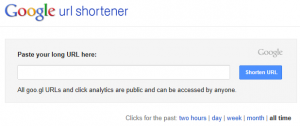 Using short URLs can seem like a quick and easy way to send someone to a page on a website that has a superlong URL. It has gained lots of popularity over the last couple of years, but there has started to be a backlash from that users when they see those short URLs.
Using short URLs can seem like a quick and easy way to send someone to a page on a website that has a superlong URL. It has gained lots of popularity over the last couple of years, but there has started to be a backlash from that users when they see those short URLs.
Why is this? Will you can blame the spammers for that. People don’t trust short URLs anymore because they can’t see the destination page though be landing on. You might be sending them to realsimple.com or marthastewartliving.com but you could just as easily be sending them to spamcity.com because they just don’t know.
People do like using short URLs because they can track how many people are clicking on it, but a lot of people are finding that they can actually get more clicks and engagement when using the true URL.
It’s not such a big problem on Facebook because when you share a page on Facebook it does show the destination URL and there’s no real point to using a short URL instead. But on Twitter, when you only have 140 characters, it’s more common to see people using the short URLs there. The good news is that Twitter can automatically shorten links for you, using their t.co link shortening service, and when it the tweet is viewed individually, it will show the full URL and the snippet from the page it is linking to.
Still insistent that you need a URL shortener to track clicks? Some companies are using their own personal URL shortener. They register a very short version of the URL, and install one of the many scripts out there that will shorten links and provide stats for doing so. However, even this is become less popular in the last year or so because of the whole trust issue. If you are a large company, you can do it, but if you are a very small company that many people don’t know, it’s not as easy to earn that trust – or just the people you recognize that that shorten URL service actually belongs to you.
 And if you still want to use a third-party URL shortener service, the two most popular shorteners are Google’s goo.gl service and bit.ly. Both provide analytical data including how many people clicked the link you shared. Do be aware that if the page is popular and has been shortened by others, it will show data for everyone who has shortened and shared, not just you.
And if you still want to use a third-party URL shortener service, the two most popular shorteners are Google’s goo.gl service and bit.ly. Both provide analytical data including how many people clicked the link you shared. Do be aware that if the page is popular and has been shortened by others, it will show data for everyone who has shortened and shared, not just you.
So when in doubt, don’t shorten your links. In the end, especially for sharing tidbits and tips, there is no real reason you need to track how many people are clicking, it is better to encourage the clicks and engagements through transparency of your links, especially for people that have been burned by clicking on a seemingly innocent shortened URL, and landing on a
